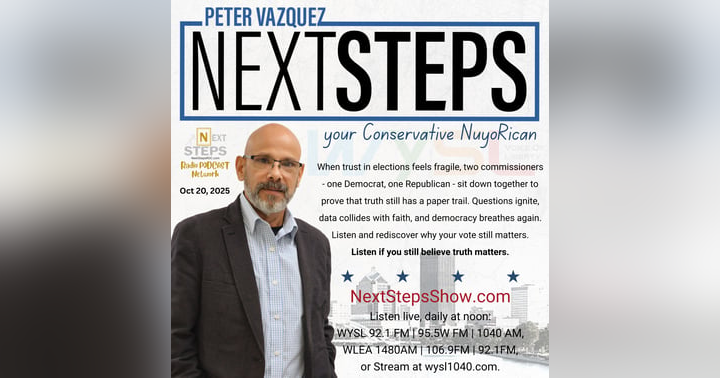
When suspicion meets transparency, democracy breathes again. Join Peter Vazquez with Monroe County’s bipartisan election commissioners as they face hard questions, reveal how votes are truly counted, and show why election integrity still matters more than ever.
The studio felt different the moment the microphones warmed. Two election commissioners - one Democrat, one Republican - took their seats side by side, not behind podiums but at the same table. No theatrics, no hedging, just a simple promise: let us show you how the people’s will is counted.
What followed was not a debate. It was a walk-through of the machinery of a republic. They described inspectors who train for hours, machines that are tested before the polls open and audited when the last ballot is sealed, and the quiet grind of list maintenance that no one sees but everyone depends on. They admitted limits, named laws, and opened the door—literally—to a new public viewing area at 435 Smith Street, where anyone can watch the work. It was the opposite of a headline; it was the sound of adults taking responsibility.
Then the phone lines lit up. A volunteer from New York Citizens Audit called with hard claims and harder questions. Another caller pressed on duplicates, on eligibility, on whether the system honors the voter or hides the truth. The air tightened. The commissioners did not flinch. “Bring the records,” they said. “Sit down with us. If there is a problem, we will fix what the law allows.” That is not a slogan; it is how a self-governing people speak to one another when they still believe in the same flag.
There was scripture too—Proverbs 11:3—about integrity guiding the upright. Not a prop, but a reminder. Elections are not only about arithmetic. They are about conscience, duty, and the ancient idea that free citizens choose their leaders in the daylight. You heard the numbers—502,242 registered voters, 215 polling sites, 3,542 trained poll workers—and you heard the invitation: come see for yourself. The truth does not fear an open door.
By the end, something had shifted. Suspicion gave way to scrutiny, and scrutiny matured into stewardship. Listeners did not get told to “trust the system.” They were asked to test it, join it, and improve it. Early voting begins Saturday, October 25. The ballot is waiting, the process is visible, and your voice is still heavy enough to move the country an inch in the right direction.
Listen to this episode if you are tired of slogans and ready for substance—if you want to hear accountability without theatrics, and courage without contempt. Then bring a friend to the polls. Liberty requires an audience, but it is built by participants.
Promote your brand on the Next Steps Show, airing on WYSL1040.com's AM 1040, FM 92.1, and FM 95.5 West stations. Discover more at nextstepsroc.com/advertise-with-us or dial (585) 346-3000 to get in touch with the WYSL team.
Have you ever dreamt of sharing your unique voice, stories, or expertise with the world through a podcast? Perhaps you're bubbling with ideas but uncertain about where to begin? The journey from idea to launch can be daunting, but that's where we come in. Dive Into the World of Podcasting with Next Steps Radio PODCAST Network! Visit NextStepsRoc.com or call Peter at (585) 880-7580.
The conversation opens with the reality that many citizens doubt election processes, then moves straight into how elections are actually run in Monroe County. The system is intentionally bipartisan from top to bottom, with opposing party officials paired throughout operations. Training standards for poll inspectors are mandated by state law, voting machines are tested before use and audited afterward, and any irregularities discovered are referred to the District Attorney for possible prosecution.
A substantial portion examines data integrity. The discussion explains why comparisons between the state’s voter database (a snapshot) and county records (which update daily) can create apparent discrepancies. Routine list maintenance is required by law and happens on a fixed schedule. Death notifications from inside New York flow reliably; out-of-state deaths often require a family notice or returned mail, which is a known gap that policymakers could fix with better cross-state sharing.
Questions from listeners press on duplicate registrations, eligibility, and outside audits. Detailed claims from New York Citizens Audit are relayed, including alleged duplicates and compliance issues; in response, the door is left open for a record-by-record review in Monroe County with a commitment to correct what can be corrected under current law. The difference between policy and administration is emphasized: voter-ID rules and DMV procedures are set by statute, and local officials implement whatever the law requires.
Operational updates include the move to 435 Smith Street with a public viewing area so citizens can watch processes in real time, and the rollout of ES&S machines to replace aging equipment (state and federally certified). By the numbers cited on air: roughly 502,242 registered voters, 215 ADA-compliant polling sites, about 3,542 trained poll workers, 1,175 machines (including about 1,000 ExpressVote XL units), 17 early-voting sites, and a budget near $14.4M. The episode closes with a call to civic stewardship: observe, volunteer, and vote, with early voting beginning Saturday, October 25.



















